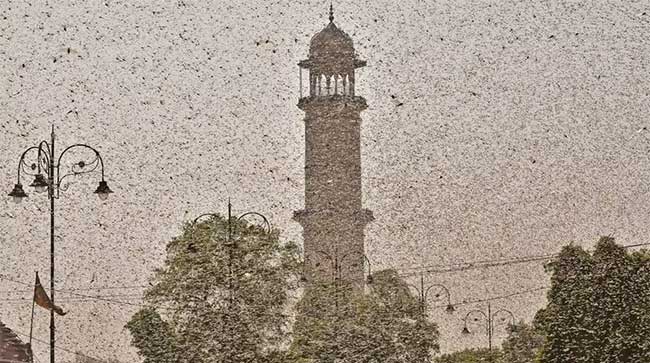'Terrific grasshopper storm' blind sky during the day in India
The Delhi metropolitan region is preparing to cope with locusts, while farmers in northern India play loud music and car horns to chase the desert grasshoppers of millions of children to sabotage their fields.
The Guardian newspaper on May 28 reported that people in the Indian capital Delhi are preparing to respond to an "invasion" of grasshoppers, in the context that many areas in the north of the country have been affected. heavy.

Crowds of locusts in Jaipur, Rajasthan earlier this week - (Photo: Vishal Bhatnagar / NurPhoto).
Changing winds may save the city, but Dr. KLGurjar, deputy director of the Grasshopper Alert Organization (LWO), advises residents here to be ready to "make a lot of noise to make the Europeans." keep flying through the city instead of landing, and don't panic. "
Many areas of India are facing the worst "epidemic" of grasshoppers in 25 years.
The skies in parts of northern India turned dark during the day as millions of grasshoppers flew around. This pest is a threat to food crops and crops in the context of the Indian people are still struggling with the Covid-19 epidemic.
Rajasthan is the most affected state, but other states such as Madhya Pradesh, Gujarat and Punjab are also surrounded by grasshoppers.
According to the United Nations Food and Agriculture Organization's grasshopper monitoring website (FAO), the locust's movement was affected by strong winds blowing westward from the Typhoon Amphan, which struck India. in the first day of this month.
About 50,000 hectares of land have been affected by grasshoppers. While some areas have been harvested, farmers in other parts of India are still witnessing locusts destroying crops. If locusts are not controlled, they fear the summer crop could be devastated.
Indians have used sprayers, car horns to deal with grasshoppers. In the fields, farmers play loud music and use any device that can make a loud noise to chase grasshoppers.
"We hope we can control the grasshopper in the next 10 days. Officials are spraying the insecticide in the early morning. When the sun rises and the grasshoppers see the heat, it is when they start to fly. Years. now there are more grasshoppers that can fly faster and travel up to 150km a day " - an official in the city of Barmer in the state of Rajasthan said.
The New York Times commented: "Covid-19, the heat and the grasshopper have formed a" terrible storm "in India".
India is not the only country affected by locusts. In February, a neighboring country, Pakistan, declared a national emergency after the grasshoppers destroyed many parts of the country.
- Discovered grasshoppers live 20 million years ago
- The truth about grasshoppers is that few people know it
- India: Severe storms, 8 deaths, 8000 evacuees
- The tornado column of the grasshopper is nearly 305m high
- Interesting discovery about grasshopper ears
- SpaceX Grasshopper reached a new height record
- Discover new fish species
- Grasshopper epidemic spread to South Sudan
- Rescue the cobra of the blind worm sneezing into the nose
- India makes smartphones for the blind
- An extremely rare pink grasshopper appeared
- Restoration of 'love song' from Jurassic
 Why do potatoes have eyes?
Why do potatoes have eyes? 'Tragedy' the world's largest carnivorous life: Death becomes ... public toilet
'Tragedy' the world's largest carnivorous life: Death becomes ... public toilet Tomatoes were once considered 'poisonous' for 200 years
Tomatoes were once considered 'poisonous' for 200 years Detecting microscopic parasites on human face
Detecting microscopic parasites on human face Grasshoppers have been ravaging the Earth since before the dinosaurs were born
Grasshoppers have been ravaging the Earth since before the dinosaurs were born  A 'specialty' dish of the season: Vietnamese people love it but there is a potential risk of illness, which can cause death
A 'specialty' dish of the season: Vietnamese people love it but there is a potential risk of illness, which can cause death  Grasshoppers cover up the sky, flying like a storm, leaving 23 countries with hunger
Grasshoppers cover up the sky, flying like a storm, leaving 23 countries with hunger  How scary are locusts?
How scary are locusts?  Why desert grasshoppers can not kill?
Why desert grasshoppers can not kill?  And yet corona virus, China has faced the 'pandemic' of locusts
And yet corona virus, China has faced the 'pandemic' of locusts 